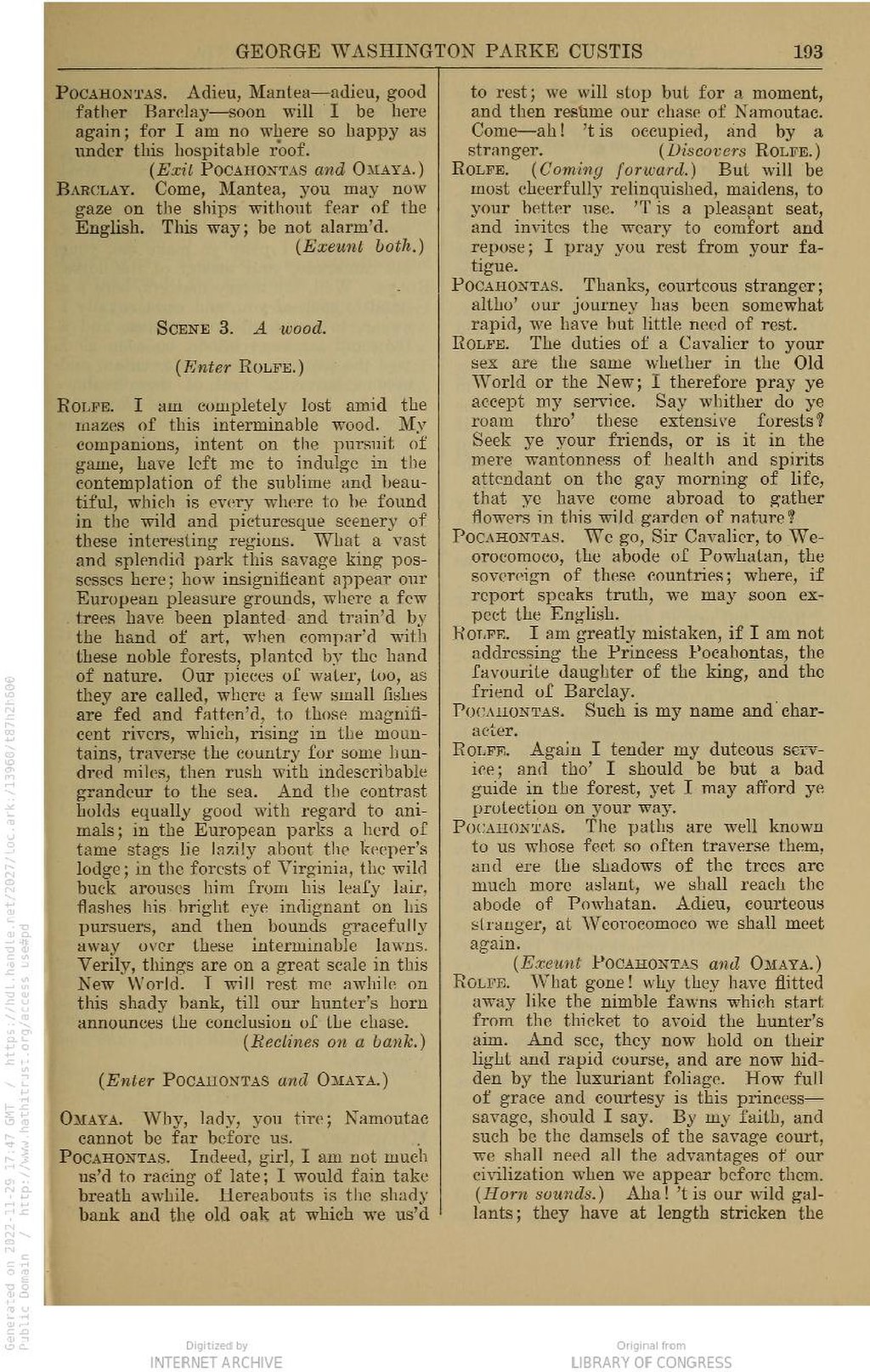GEORGE WASHINGTON PARKE CUSTIS
193
Pocahontas. Adieu, Mantea—adieu, good father Barclay—soon will I be here again; for I am no where so happy as under this hospitable roof.
(Exit Pocahontas and Omaya.)
Barclay. Come, Mantea, you may now gaze on the ships without fear of the English. This way; be not alarm'd.
(Exeunt both.)
Scene 3. A wood.
(Enter Rolfe.)
Rolfe. I am completely lost amid the mazes of this interminable wood. My companions, intent on the pursuit of game, have left me to indulge in the contemplation of the sublime and beautiful, which is every where to be found in the wild and picturesque scenery of these interesting regions. What a vast and splendid park this savage king possesses here; how insignificant appear our European pleasure grounds, where a few trees have been planted and train'd by the hand of art, when compar'd with these noble forests, planted by the hand of nature. Our pieces of water, too, as they are called, where a few small fishes are fed and fatten'd, to those magnificent rivers, which, rising in the mountains, traverse the country for some hundred miles, then rush with indescribable grandeur to the sea. And the contrast holds equally good with regard to animals; in the European parks a herd of tame stags lie lazily about the keeper's lodge; in the forests of Virginia, the wild buck arouses him from his leafy lair, flashes his bright eye indignant on his pursuers, and then bounds gracefully away over these interminable lawns. Verily, things are on a great scale in this New World. I will rest me awhile on this shady bank, till our hunter's horn announces the conclusion of the chase.
(Reclines on a bank.)
(Enter Pocahontas and Omaya.)
Omaya. Why, lady, you tire; Namoutac
cannot be far before us.
Pocahontas. Indeed, girl, I am not much us'd to racing of late; I would fain take breath awhile. Hereabouts is the shady bank and the old oak at which we us'd to rest; we will stop but for a moment, and then resume our chase of Namoutac. Come—ah! 't is occupied, and by a stranger.
(Discovers Rolfe.)
Rolfe. (Coming forward.) But will be most cheerfully relinquished, maidens, to your better use. 'T is a pleasant seat, and invites the weary to comfort and repose; I pray you rest from your fatigue.
Pocahontas. Thanks, courteous stranger; altho' our journey has been somewhat rapid, we have but little need of rest.
Rolfe. The duties of a Cavalier to your sex are the same whether in the Old World or the New; I therefore pray ye accept my service. Say whither do ye roam thro' these extensive forests? Seek ye your friends, or is it in the mere wantonness of health and spirits attendant on the gay morning of life, that ye have come abroad to gather flowers in this wild garden of nature?
Pocahontas. We go, Sir Cavalier, to Weorocomoco, the abode of Powhatan, the sovereign of these countries; where, if report speaks truth, we may soon expect the English.
Rolfe. I am greatly mistaken, if I am not addressing the Princess Pocahontas, the favourite daughter of the king, and the friend of Barclay.
Pocahontas. Such is my name and character.
Rolfe. Again I tender my duteous service; and tho' I should be but a bad guide in the forest, yet I may afford ye protection on your way.
Pocahontas. The paths are well known to us whose feet so often traverse them, and ere the shadows of the trees are much more aslant, we shall reach the abode of Powhatan. Adieu, courteous stranger, at Weorocomoeo we shall meet again.
(Exeunt Pocahontas and Omaya.)
Rolfe. What gone! why they have flitted away like the nimble fawns which start from the thicket to avoid the hunter's aim. And see, they now hold on their light and rapid course, and are now hidden by the luxuriant foliage. How full of grace and courtesy is this princess—savage, should I say. By my faith, and such be the damsels of the savage court, we shall need all the advantages of our civilization when we appear before them. (Horn sounds.) Aha! 't is our wild gallants; they have at length stricken the
